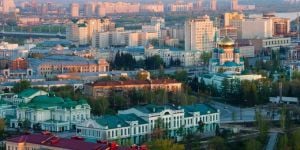
Russia's prosperous economy has been attracting foreigners from across the globe over the years. In fact, young professionals worldwide dream of working or setting up a business there so as to benefit from its economic growth along with various incentives which have been set up by local authorities. Various opportunities are available in different fields such as information and communication technology, construction, engineering, industry, consumer products. High profile jobs are also available for highly qualified professionals.
You should inquire about formalities to be completed beforehand, if you wish to work in Russia. You are likely to require a work permit and a work visa.
Work permit
The number of foreign workers who are allowed to work in Russia is regulated by a work permit quota system, except for high executives, directors, and experts. Hence, you will have to apply for a work permit if you wish to work there. But your potential employer may also handle related formalities on your behalf before the 1st of May of the year preceding your recruitment. The application has to be made at the Russian Immigration Service.
Once you have obtained your work permit, you may apply for a work visa at the nearest Russian embassy or consulate to your place of residence.
Good to know:
Independent entrepreneurs, volunteers, teachers and journalists do not require a work visa to be authorised to work in Russia.
Find a job
You can find a job in Russia through various channels: newspapers, job websites, recruitment agencies, social networks, etc.. Word of mouth may also help if you have friends or contacts in the country. Furthermore, take the time to spot a few big firms to which you may send spontaneous job applications.
Note that the country also hosts numerous international companies which are more likely to recruit qualified professionals.
Job application
While applying for a job in Russia, you should send your resume, preferably in Russian, along with a cover letter. The description should detail your last three jobs, your written and spoken language skills, as well as your computer skills and your date of birth. Consider getting a free CV review at TopCV. Note that many companies appreciate references from your former employers and do not hesitate to contact them. Hence, you are advised to mention your previous employers' contact details in your resume. Note that appearances are a key criteria for employment in Russia. Some employers refuse considering applications without a picture of the candidate. You are advised to attach a recent passport-size photo of yourself, preferably smiling, to your resume. This could help in case the employer decides to call you for an interview.
Interviews
Being elegantly dressed at your interview appointment will definitely be an advantage. It is also best to keep calm and smile. Also be honest and responsive along with a little sense of humor. Moreover, you have to master Russian and English. A knowledge of a further modern language may help, depending on the position.
Candidates having studied engineering or finance in prestigious universities or higher education institutes have better chances of being considered.
Good to know:
Russian cities regularly hold job fairs, offering job opportunities to graduates and young professionals.
Corporate culture
The Russian corporate culture is deeply marked by hierarchy and bureaucratic proceedings. Decisions are taken quite slowly. Expect at least two to three interviews, sometimes with different people from the company, before an offer is made to you.
Not all Russian workers speak foreign languages. Hence, you are advised to improve your level of Russian, unless you are working in an international company where you will be surrounded by bilingual or multilingual colleagues.
Labour conditions
In general, Russian workers are entitled to a forty-hour work week, but the maximum legal working week consists of 54 hours. If you are performing night shifts, you will usually be working from 10pm till 6am the next day.
Weekends and public holidays are deemed to be rest days unless you have a written agreement to the contrary with your employer. You will also be eligible for 28 days of annual leave per year, according to seniority. You shall also be compensated for the use of your private vehicle and be eligible to quarterly and biannual bonuses, or even to a company car if you are working in the sales field.
Social contributions
Employees do not have to make social contributions as their employers are responsible for these. Thus, employers have to pay:
- health insurance (territorial level): 3%
- health insurance ( federal level): 2.1%
- pension fund: 26%
- Social Security Fund: 2.9%.
Useful links:
Head Hunter Russia
Superjob
Association of European Businesses
Trudvsem
Career Jet
Indeed
eFinancial Careers
We do our best to provide accurate and up to date information. However, if you have noticed any inaccuracies in this article, please let us know in the comments section below.








